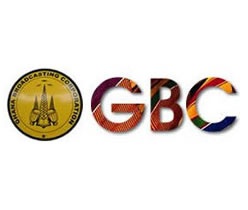
The storied antagonism that was only recently cooled down, after it had fouled relations between the Governing Board of the Ghana Broadcasting Corporation (GBC) and the worker’s union for a very long time is about to be stirred again.
Thanks to yet another round of monkey business that the National Media Commission (NMC) is suspected of pushing with the GBC, events leading to the appointment of a Deputy General for the state broadcaster are believed to be shrouded in favoritism.
Sources at the GBC tell of how the NMC is blindly going through the motions to appoint an amateurish woman lawyer for the highly technical position, when there is a richly qualified technical man whose track record alone pales the woman into insignificance.
The 'Enquirer' cannot independently verify, but wild allegations making the rounds at the state broadcaster have it that the NMC is pushing to have the woman in place there because the lady in question has some deep pocket people, including a one time love interest, pushing her cause.
The development has tensed up emotions among some workers at the GBC and placed the Local Workers Union on a hair-trigger for mass protest in the likelihood that the woman is appointed, sources say.
A source at the GBC, in confirming the workers mood, warned in an interview with 'The Enquirer' that the annoyance that the NMC is about to trigger could be a massive upset to an uneasy peace that was only recently brokered between the Local Union and the Board, after the two had endured a chaotic relationship for a very long time.
Kwabena Sarpong-Anane, recently retired GBC DG, used the best of his negotiation skills to get the Board, after the two had been at each others throat since the responsibility for appointing Directors at the GBC moved from the President to the NMC.
Incidentally, that longstanding chaotic relationship that had existed between the Local Workers Union and the GBC Board had mostly been the doing of the NMC.
Since the National Media Commission took over he appointments of senior staff of the state broadcaster in 2000, there is not a single Director General that the NMC appointed that successfully completed his tenure.
From Mr. Ago Adjetey, who managed to be in office from 2000 to 2002, to Eva Lokko, who was in office from 2002 to 2005, through to William Ampem Darko, who was knocked off in 2010 after he had assumed office in 2007, the lineage of GBC Directors-General appointed by the NMC had been one of troubled tourists.
The tenure of Berifi Apenteng, who stepped down as DG early this year, after he had assumed office in 2011, was no exception to the tumultuous office days of his predecessors, who had all been hotly agitate against by workers at large, and the Local Workers Union in particular.
Even the current Director General, Maji, (RTD) Albert Donchebe, who is enjoying workers support at the moment, after he took office in May this year, may only be experiencing the calm-that-comes-before-the-bang at the moment.
In all the protestations that greeted the NMC’s appointed Directors General in the past, the workers had acted on the conviction that the NMC had neglected talent for cronies in the appointment of the GBC’s Director-General.
It is feared that the same cronyism that went into the appointment of GBC’s long line of half-serving Director-General in the past, is what the NMC is bringing to the appointment of the Deputy Director General.
Even though the GBC’s organogram makes room for the appointment of two Deputy Director-General, the NMC has always made do with the appointment of one.
The Deputy Director General’s position is a highly technical one, in that he is placed in charge of all if the GBC’s regional operations.
Unlike the Director General’s functionality, which is mainly administrative and based in the national headquarters in Accra, the Deputy Director General’s area of core function, the regions, is mostly made up of machines and technical equipment.
The state broadcaster has 33 high-powered TV transmission, 11 FM and 4 Community FM studio centers and 31 radio transmitters spread across the regions.
Because the regions, mostly, do not generate their own content or programme, but receive beams from Accra, the regions have very few staff.
Indeed about 70% of all of GHC’s staff are based in Accra, where programme content are generated.
This is what makes the Deputy Director General’s area of function, to mainly comprise engineering or technical stuff.
Very importantly, the technical nature of the Deputy DG’s job automatically places Ghana’s impending migration from analogue to Digital Terrestrial Broadcasting, along with the rest of the world by 2015, in his responsibility.
In view of this, a highly technical person is the only ideal candidate for the Deputy Director General position at the State broadcaster.